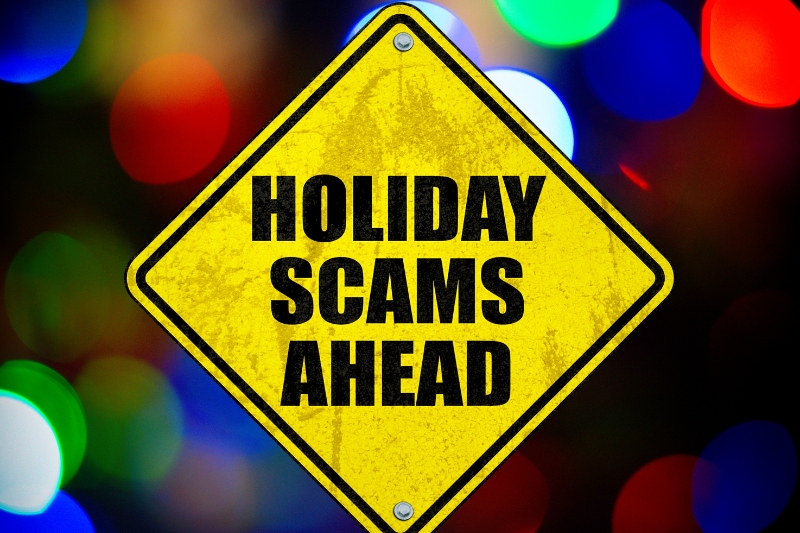Now that we are entering into the holiday season, scammers are more active than ever. They use the excitement and commotion from the holidays to prey on a distracted audience. We have identified several of their tactics and want to help you learn how to identify and avoid them. Keep the joy in the holidays by staying vigilant against these common holiday scams.
Gift Card Scams: What do you get someone who doesn’t have an itemized Christmas list? A gift card, of course! Gift cards are a great choice, but are also a potential avenue to fraud.
- Card draining: Scammers will go to retail stores and take card numbers and activation codes. Then reseal the card and packaging in hopes someone will purchase it and load it with funds. Scammers will patiently wait until a card is activated then immediately drain the card. This scam is especially frustrating because tracking down the culprit is extremely difficult. In order to avoid this scam, try buying gift cards that are near registers or close to employees as fraudsters are more likely to steal information form less monitored areas. If you are grabbing from a stack grab cards, go for the back of the rack in hopes that they haven’t been tampered with. Better yet, ask for a card from behind register to ensure secureness.
- Online Contests: You may see contests across social media offering gift cards or other vouchers in exchange for simply completing a survey. Think twice before participating, as many times the survey is not legitimate and only exists as a means to capture your personal information to commit identify fraud. In order to avoid this scam, only interact with verified businesses. If the offer seems generous, it probably is too good to be true.
Package Scams: billions of packages were shipped during the last holiday season so it is not surprising that fraudsters have developed scams to go along with them.
- Text Message: one of the most prevalent scams is involves receiving a text or email regarding information on a recent package/order and invites you to click on a link. There are many illegitimate reasons they will give. Here are a few we have seen:
-
-
-
- Click to view tracking updates
- Click to view your new estimated delivery date
- Click to pay additional shipping fees
- Click to cancel cancellation
- Click to leave delivery instruction.
-
-
-
Fraudsters will often send urgent messages to get you to react. To avoid this scam, do not click on any links regarding orders/deliveries. Instead go to the vendors site you ordered the package from and check on the order status from there. To weed out fake notifications from the real ones, consider tracking them through an app like Route. This allows you to track all your orders from various carriers in one convenient location!
- Missed Packages: Missed packages are the worst especially when you are wanting to get them under the tree before Christmas morning! Fraudsters know this so they have created a tactic where they will leave a note on your door claiming to have a package for you that couldn’t be delivered. This note usually contains a number to call to reschedule the delivery. Once you call you will be asked questions around verifying your identity in order to confirm the correct package, which ultimately could expose your personal information. If you receive a missed delivery note, do not call the number on the sheet. Go to the carriers website and find there customer service number and call that regarding the package to confirm its legitimacy.
We hope you’ll enjoy the holidays without the stress of dealing with fraud. But, if you’re a victim, here’s what to do:
- Report the crime to local law enforcement
- Alert your banks and credit institutions
- File a complaint with the FBI
- Report the scam to the FTC
Even if you simply encounter a scam, the FTC encourages you to report it to help others avoid becoming a victim. We hope this article helps you, and we wish you a jolly scam-free holiday!


